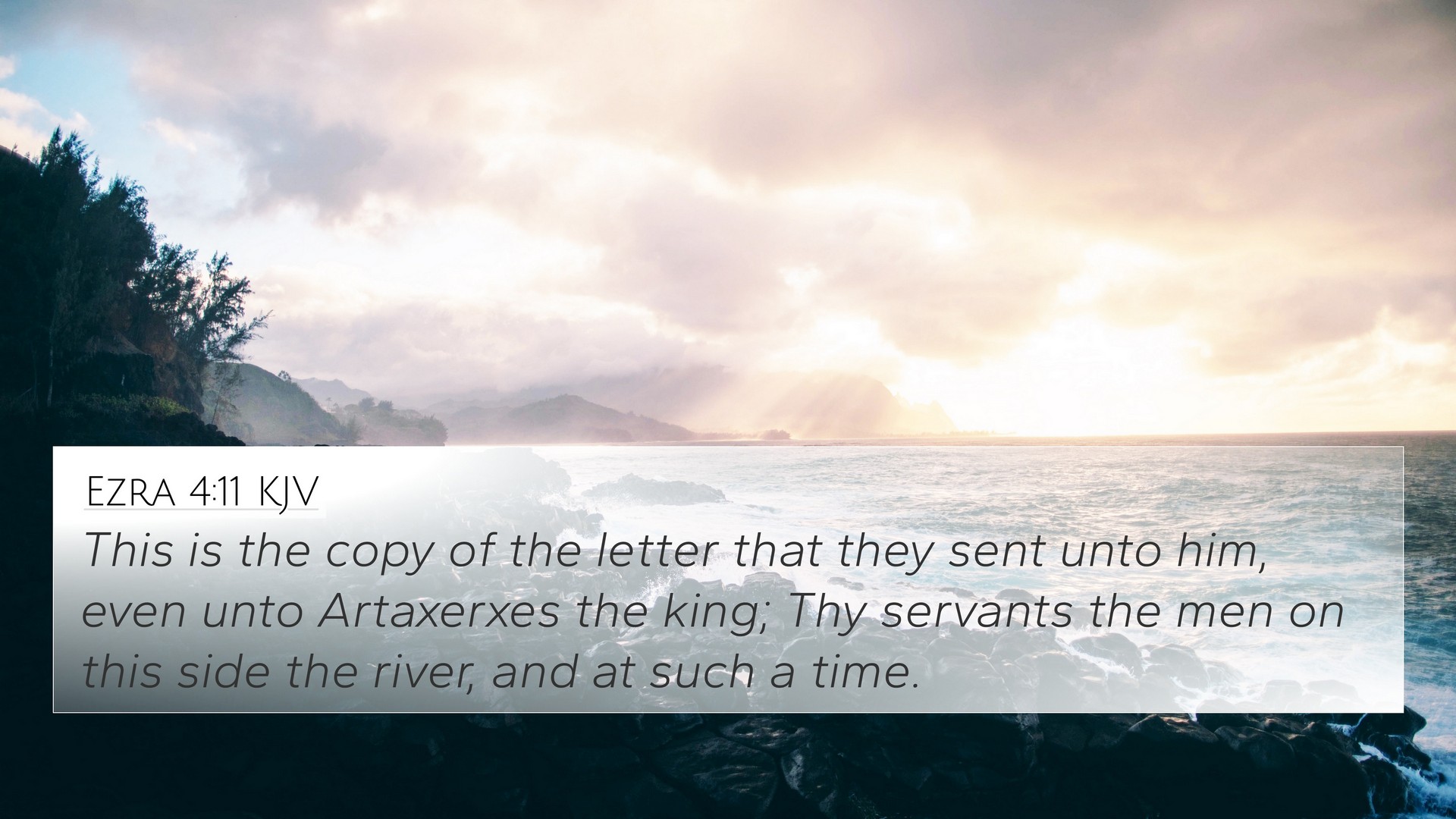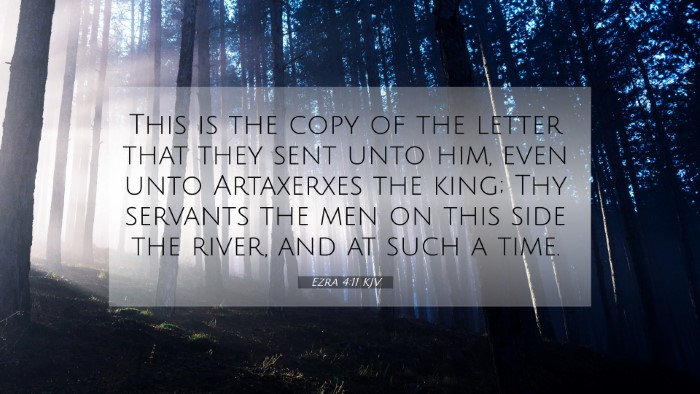Old Testament
Genesis Exodus Leviticus Numbers Deuteronomy Joshua Judges Ruth 1 Samuel 2 Samuel 1 Kings 2 Kings 1 Chronicles 2 Chronicles Ezra Nehemiah Esther Job Psalms Proverbs Ecclesiastes Song of Solomon Isaiah Jeremiah Lamentations Ezekiel Daniel Hosea Joel Amos Obadiah Jonah Micah Nahum Habakkuk Zephaniah Haggai Zechariah MalachiEzra 4:11 Similar Verses
Ezra 4:11 Cross References
This is the copy of the letter that they sent unto him, even unto Artaxerxes the king; Thy servants the men on this side the river, and at such a time.
Uncover the Rich Themes and Topics of This Bible Verse
Listed below are the Bible themes associated with Ezra 4:11. We invite you to explore each theme to gain deeper insights into the Scriptures.
Ezra 4:11 Cross Reference Verses
No cross reference images were found in our system for this Bible passage.
Ezra 4:11 Verse Analysis and Similar Verses
Understanding Ezra 4:11
Verse: "This is the copy of the letter that they sent unto him, even unto Artaxerxes the king; Thy servants the men on this side the river, and at such a time."
Summary and Analysis
Ezra 4:11 is part of a broader narrative relating to the challenges faced by the Jewish returnees during their efforts to rebuild Jerusalem. The verse contains a letter sent by adversaries of the Jews to King Artaxerxes, outlining their concerns regarding the rebuilding project.
Context of the Verse
This verse highlights a pivotal moment in the struggle of the Jews as they attempt to restore their city and their worship practices. The letter serves not only as a complaint but also as a strategic move to halt the progress of the rebuilding efforts. Understanding this context is essential for grasping the opposition that the Jews faced.
Insights from Public Domain Commentaries
-
Matthew Henry
Henry emphasizes the political and social dynamics involved in the rebuilding efforts. He points out that the adversaries were not merely opposed to the reconstruction of the temple and city but were also motivated by a desire to undermine the authority and legitimacy of the Jewish people.
-
Albert Barnes
Barnes discusses the implications of the letter sent to Artaxerxes, noting its strategic significance in the broader geopolitical context of the period. He highlights how the letter reflects the fears of the surrounding nations regarding a restored Jewish state which they perceived as a threat.
-
Adam Clarke
Clarke provides a detailed analysis of the terminology used in the letter, explaining its formal tone and the legal implications it had. He also mentions the intentions behind their communication, which were to persuade the king to take action against the Jews.
Thematic Connections
This verse connects with various themes found throughout the scripture, including:
- The theme of opposition to God’s work (Nehemiah 4:1-3)
- The nature of political power and authority (Romans 13:1)
- Restoration and renewal (Isaiah 61:4)
- The return from exile and God’s faithfulness (Jeremiah 29:10-14)
- Enemies of the faith (Matthew 10:16-22)
- Communications with rulers (Daniel 6:6-9)
- The importance of prayer and seeking God’s favor (James 5:16)
Cross-References
Ezra 4:11 can be cross-referenced with multiple verses, helping to broaden the understanding and implications of the verse:
- Nehemiah 2:10 - The anger of Sanballat and Tobiah regarding the Jews’ intentions.
- Esther 3:8-9 - Haman’s letter to King Ahasuerus to oppose the Jews.
- Isaiah 54:17 - No weapon formed against you shall prosper.
- Psalms 118:6-7 - The Lord is on my side; I will not fear.
- Jeremiah 29:4-7 - God’s commands to the exiles to seek the peace of the city.
- Daniel 3:12 - Accusation against Shadrach, Meshach, and Abednego.
- Romans 8:31 - If God is for us, who can be against us?
- Mark 13:9 - You will be brought to trial before governors and kings.
- Acts 4:18-20 - The apostles’ defiance against the authorities.
- Matthew 5:10-12 - Blessed are those who are persecuted for righteousness' sake.
Conclusion
Ezra 4:11 serves as a reminder of the persistent challenges that accompany faith and purpose. Through the lens of historical context and theological reflection, one can find encouragement in understanding the nature of opposition while also recognizing the sovereignty of God in guiding His people through adversity.


